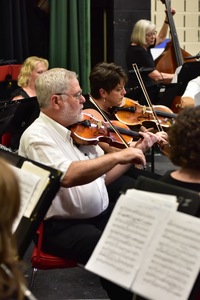

The Heart of Appalachia Community Orchestra practices before a June concert. (photo by David Grace)
For many people, their musical performance lives end when they graduate from school. The Heart of Appalachia Community Orchestra offers them an opportunity to continue making music.
"Most of the members played in band or orchestra in high school, but left music behind as they started their careers," says Kevin Townsend, director. "A community orchestra allows people to pick up that instrument and have fun playing in a group. We also get a chance to play orchestral music for audiences that likely would not hear a live orchestra otherwise."
The orchestra is made up primarily of music hobbyists, people who just enjoy listening to and playing music. The group also has a few music educators or former music educators, but most members have a non-music related career.They range in age from high school through retirees. Most members come from the Lebanon and Abingdon areas, but they also have members who drive from Kentucky and North Carolina.
Any musician who wishes to join the group is welcome. There is no audition process. "I have never asked someone not to play with us," Townsend says. "However, we generally play music scored for orchestras, and certain instruments are not included in most orchestral works. For instance, if a banjo player wanted to play with us, I might try to find a selection or two that would work with a banjo, but none of our music has an included banjo part.
"While I have never askedsomeone not to play with us, I have had a few leave the group after they realized that the level of music we play was a littlebeyond their abilities. Others stick around and play where they can and even occasionally simplify parts, for example leave out complicated runs," he says.
The group practices Thursday evenings from 6-8 p.m., in the Lebanon High School Band Room, in Lebanon, Virginia. They do not rehearse during the summer after their final concert, July 4. They resume rehearsing Sept. 15.
"While I would prefer if everyone could attend every rehearsal, we would have an extremely small group if perfect attendance was required. I understand that we all have busy lives and things come up; therefore we have a flexible attendance policy," Townsend says.
The orchestra primarily plays selections for full orchestra. At most concerts they play one or two selections for string orchestra, and the group has a brass ensemble that usually plays one or two selections. Townsend often asks if anyone would like to play a solo, usually with piano accompaniment, or he has a small ensemble play.
"In each concert, I try to play a few classical - or traditional -orchestral works, a few pop selections or movie themes and any type of music that seems appropriate for the season or setting. I knowdifferent people have different preferences, so I try to play a wide variety of music so everyone hears or plays something they like - or everyone hears something they really dislike," Townsend says.
The group performs at the Clinch River Festival in June. They perform two spring concerts: one at Lebanon Middle School and the other at Virginia Highlands Community College. In December, they perform a Christmas concert at Lebanon High School.
Their next concert is a patriotic concert at Lebanon Middle School, July 4 at noon. The program includes "The Star Spangled Banner," "Here's to the Military," "1812 Overture," "The Battle Hymn of the Republic," "American Patrol," "Star Wars," "Steal Away," "Rondeau," "A Salute to the Big Bands" and "The Stars and Stripes Forever."
"We try to have fun as a group of friends. I think people are more likely to continue to play with the ensemble if they have fun. Therefore we try to joke and enjoy the rehearsal times while still getting in a serious rehearsal. We usually have a cookout after the July 4 concert, and we often will either go out to eat together or have a party or social after the other concerts.
"I try to always have a few selections that are relatively easy that we can work up easily and almost everyone can play. I also try to include a few challenging selections so even the moreskilled players can bestretched as musicians."
The group's instrumentation varies from concert to concert and season to season. Typically it consists of violins, viola, cello, string bass, flutes, clarinets, oboe, bassoon, trumpet, French horn, trombones, percussion and a piano.
Townsend says that the biggest challenges of a volunteer orchestra are "having enough instrumentalists and especially the right instrumentation. We need more string players. This season we've been scrambling to find percussionists to play with us because our regular percussionist was unable to play with us this season. Another challenge is covering parts - ensuring that any critical parts are covered - especially if one instrument is missing.
"We have a wide range of abilities and often one section has to hold back, because either another section is not as strong in ability or that section just doesn't have the ideal number of players," he says.
Trying to pick concert dates that work for the largest number of orchestra members is also problematic. The music and the relationships between the musicians are highlights.
"We do not have formal chairs.Often, musicians will swap parts around (person X plays first part on selection A, person Y plays first part on selection B).In other sections, there is less part swapping. Usually, the musicians can recognize who is the most experienced or best player in that section and the section follows that person's lead."
To see how they work together, visit the Lebanon Middle School, July 4, at noon. If you would like to join the group, contact Townsend at kkirkt@yahoo.com or 276-701-5737.